Linda Rodriguez's Blog, page 13
June 22, 2013
Resistance

You’ve started your story or novel, and you have a few good pages that you’re pleased with. You have to go out of town (or do something else) for a few days, but you know where you’re going with your writing project, and you can’t wait until you get back to the story you’re working on. When you do return, you set up time to write and do everything you can to be prepared and in perfect shape to work. The morning/afternoon/evening to get started again happens and bang! You run smack into some invisible force that refuses to let you write those pages that you want and need to write.
This is resistance, and it’s the common companion of the writer. It’s the enemy, an internal saboteur, fifth column located inside your head. You may find yourself checking email or Facebook or Twitter, going online to do some research that suddenly seems imperative and falling down the Google rabbit hole. You might find yourself organizing your desk or your files or doing a load or three of laundry. You may find yourself cleaning out closets or suddenly running errands that you’ve been putting off for days or weeks, which have suddenly become imperative. Anything, anything at all, but write what you’ve set yourself to write.
As someone who writes for a living, I’ve a long, close acquaintanceship with my own resistance. Often, I believe I have it under control. Then, it shows up in some new form to devil me. Often, it can be quite persuasive. It is true that any project, especially a big one, will be easier to accomplish in an organized space. It’s true that some research needs to be done before you put words to paper. And often clearing the decks before you work can leave your mind readier to sink into your created world. It whispers perfectly plausible excuses to me that will end up keeping me from writing or from writing as much or as well as I want and intend to write.
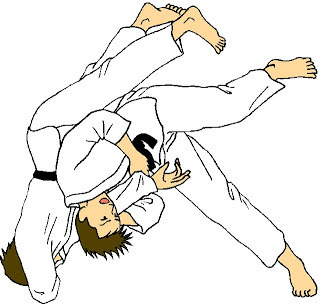
One of the ways I’ve found to subdue my resistance is to always have another ongoing project. This takes advantage of one of resistance’s own techniques to throw it against itself as judo and other martial arts do.
This does not mean, “Start another book.” All those million new book ideas that that resistance sends trying to seduce you from your project should just be written down in an idea notebook or document and promptly forgotten until the book is over and it’s time to look for new concepts. No, I’m talking about another project that you’ve decided ahead of time you want to work on in addition to the main project rather than instead of the main project.
I offer myself the reward of working on this secondary story when I’ve met my goal on the main project. If it’s a very bad day and resistance is winning, I might allow myself to work on the other project first for a limited time to get my writing muscles moving. I set a timer, though, and when it rings, I must move onto the main book. Often, I may be doing something that’s more fun on the secondary project, such as research or exploratory planning and note making. This makes it an ideal reward.
The nice thing about using a secondary project in this way is that, often by the time I’ve finished my main project, my secondary project is well underway and becomes my new main project while I set up a new secondary project to help me deflect the power resistance wields over me. Stephen King once said, “A change is as good as a rest,” and I think he was right. Also, this technique weakens the power of resistance by making it believe that I am giving way to it, at least somewhat. Yet, it keeps me productive.
What do you do when you encounter resistance? Have you found successful ways to defeat it?
Published on June 22, 2013 18:46
June 16, 2013
For Dad on Father’s Day
My birth father was a violent, unpredictable man. After he and my mother finally divorced, the last thing any of us kids wanted was another man around. So when Mother remarried, we weren’t the most welcoming to our stepfather. But he won us over with his quiet steady caring, his reliable responsibility, and his willingness to take on all five of us, to become Little League coach and Scout leader. Eventually we were calling him “Dad.”
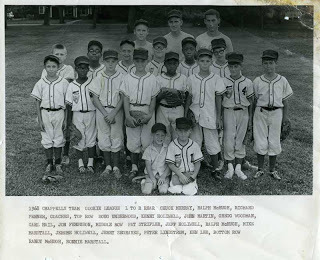
Mother died first. Years later, when Dad was facing a protracted end due to cancer and had to be in a nursing home in a town where none of us kids lived any longer, my sister and I divided the week between us to go stay in that town and spend each day with him, our brothers pitching in when they could. When Dad’s end was near, my sister called, and I packed my kids in the car and drove like a drag racer to make it to that town in time. We all did. Dad died in my arms and my sister’s while the boys all stood around him as close as they could get. Afterward, one of the nursing-home aides said to me, “Surely, that man was loved!”
This poem is for Dad on Father's Day.
CONVERSATION WITH MY MOTHER’S PICTURE
You and Dad were entirely happy here—
you in purple miniskirt, white vest and tights
(you always wore what was already too young
for me), Dad in purple striped pants,
a Kansas State newsboy’s cap
made for a bigger man’s head.
You both held Wildcat flags and megaphones
to cheer the football team who,
like the rest of the college, despised you
middle-aged townies, arranging for their penicillin
and pregnancy tests and selling them
cameras and stereos at deep discount.
But you were happy
in this picture, before they found
oat-cells in your lungs.
After the verdict, he took you to Disneyland,
this man who married you and your five children
when I was fifteen. He took you cross-country
to visit your family, unseen
since your messy divorce.
He took you to St. Louis
and Six Flags Over Texas and to Topeka
for radiation treatments.
I don’t think he ever believed
you could die. Now he’s going
the same way. And none of us
live in that Wildcat town with the man
who earned his “Dad” the hard way
from suspicious kids and nursed
your last days. For me, this new dying
brings back yours, leaving me only this image
of you both cheering for lucky winners.
Published in Heart’s Migration(Tia Chucha Press, 2009)
Published on June 16, 2013 03:59
June 13, 2013
Guest Post: Richard Godwin Writes About Obsession and Identity
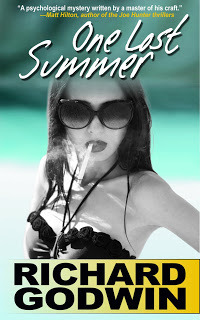
Richard Godwin is a fascinating British crime writer who, like me, has a background as a poet. He also has a blog on his website (link at the bottom of the post) on which he holds the most thoughtful and reflective conversations with other writers. He has a great new novel, One Lost Summer, out now, and I'm pleased to have him with us talking about obsession and identity. ONE LOST SUMMER AND IDENTITY. One Lost Summer is in many ways a novel about identity and lies. It is about the lies people tell themselves to survive and the extent to which they may remain unknown in a person’s character and by those closest to them. It is about desire and obsession and it is about summer and the secrets your neighbour carefully hides from you while he or she keeps up a facade.
This is a brief synopsis of the novel:
Rex Allen loves star quality in women. He moves into a new house in a heat wave with few possessions apart from two photographs of his dead daughter. His next door neighbour, beautiful Evangeline Glass invites him over to one of her many summer parties, where he meets her friends and possessive husband Harry. Rex feels he knows Evangeline intimately. He starts to spy on her and becomes convinced she is someone other than who she pretends to be. When he discovers she has a lover, he blackmails her into playing a game of identity that ends in disaster.
One Lost Summer is attracting some great reviews. Reviewers are commenting on its tight suspense and haunted feeling, as well as the intense drama that plays itself out between Rex and Evangeline and the breathtaking ending. The narrative contains many surprises, not least those that come from Rex’s past. But there are also the surprising revelations that occur in his meetings with Evangeline, who he lures to his house once a week for two hours to act out the part of Coral, a woman who remains a mystery until the end. She may be nothing more than a figment of Rex’s imagination or she may be Evangeline’s alter ego.
The central characters are altered by the sequence of events one torrid summer. One of the things I wanted to explore when I wrote One Lost Summer was the extent to which the irrational governs peoples’ lives. And obsession is a key theme in the novel. It is there in Rex, the first person narrator of the novel, as this passage shows:
“Obsession is not a modern disease. Its roots lie deep inside humanity and may be the reason we’re here. You don’t know you’re obsessed until you can’t move, until all you see is the one thing. By then the tendrils have wrapped themselves around your unsuspecting heart. They’re delicate at first in their unfolding, touching you in the dark, like the soft caress of a lover at dawn. Then you know they’re squeezing the blood out of you. And you realise you will have to hack them away, and with them some living beating part of yourself to be free.I held the camera and captured her image again and again that intoxicated summer when music filled the gardens of Broadlands Avenue, and Evangeline was high forever. Stars have a rare quality, an ability to take away the smallness most men feel. They’re more corrupt than us, but the corruption is better hidden, and their appeal is a lie, the biggest drug you will ever know. Evangeline was a complete balance of all the qualities famous stars have. She knew she was a rare flame. All that summer I watched her. I caught her laughing, smiling, looking away from Harry, alone, contemplating her day. I took her with shopping bags on the empty drive next door, and I filmed her sunbathing by the pool, her body tanned and glowing in the unnatural sun that seemed to set that time apart. For she seemed to exist outside time. And I captured her and made her mine.
I spent my evenings with a glass of Montrachet chilling my tongue as I sipped her image from the Plasma screen in my living room. I fed on her. The X bridged the space between us. I zoomed in on her, caressing her skin with the lens. I entered her world like a hummingbird penetrating a flower, my heart beating like rapid wings. She existed in my watchfulness and awoke my desire. When I wasn’t filming her, time was static. There were no clocks in The Telescope. I felt erased when I wasn’t watching her image. My house had no past and no future. I tidied away unpacked boxes, placing them in cupboards. I never used most of the rooms, existing in solitude, with only the films I took. And I felt more and more that I was part of a plot, and my only defence against it was the camera, as if Evangeline and Harry knew things that they were keeping from me and the X would find them out. I felt chilled, as if some lost piece of knowledge was frozen inside me. Sometimes at night as the Glenfarclas wore off I could hear icebergs breaking in the distance, and then the notes of Fleetwood Mac’s “The Chain” would stab at my brain like shards of glass against a nerve.”

BIO.
Richard Godwin is the author of critically acclaimed novels Apostle Rising and Mr. Glamour. One Lost Summer is his third novel. It is a Noir story of fractured identity and ruined nostalgia. He is also a published poet and a produced playwright. His stories have been published in over 29 anthologies, among them his anthology of stories, Piquant: Tales Of The Mustard Man.
Apostle Rising is a dark work of fiction exploring the blurred line between law and lawlessness and the motivations that lead men to kill. Mr. Glamour is about a world of wealthy, beautiful people who can buy anything, except safety from the killer in their midst.
Richard Godwin was born in London and obtained a BA and MA in English and American Literature from King's College London, where he also lectured. You can find out more about him at his website www.richardgodwin.net , where you can also read his Chin Wags At The Slaughterhouse, his highly popular and unusual interviews with other authors.
One Lost Summer is available at all good retailers and onlineatAmazon.com http://www.amazon.com/One-Lost-Summer-Richard-Godwin/dp/0956711340/ref=sr_1_1?s=books&ie=UTF8&qid=1369835549&sr=1-1&keywords=one+lost+summer+by+richard+godwinAmazon.co.uk http://www.amazon.co.uk/One-Lost-Summer-Richard-Godwin/dp/0956711340/ref=sr_1_1?ie=UTF8&qid=1369835613&sr=8-1&keywords=One+Lost+SummerThe Book Depository http://www.bookdepository.co.uk/One-Lost-Summer-Richard-Godwin/9780956711342Foyles http://www.foyles.co.uk/witem/fiction-poetry/one-lost-summer,richard-godwin-9780956711342
You can find out more about Richard Godwin at his website: http://www.richardgodwin.net/ Follow him on Twitter https://twitter.com/stanzazone
Published on June 13, 2013 22:00
Talking about Writing Mysteries at Book Country
I'm talking about writing mysteries, finding surprises as you write, letting character create your book, and writing contests today at
Book Country
.
Published on June 13, 2013 13:10
June 11, 2013
My Top 10 Must-Read Books for Writers
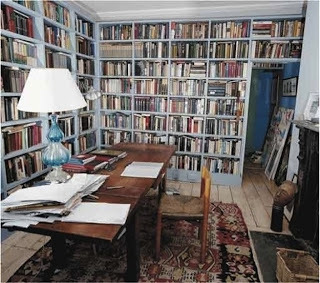
I have a larger collection of books on creative writing than most college libraries own. I have been collecting, reading, and studying them all my life. And in one way or another, I have found them all useful.
Some recapitulate concepts, techniques, and tips from many other books, but they will perhaps have one I haven’t yet encountered—or they will express one or more I’ve met before in such a way that it sinks in more deeply than it did when I ran across it earlier. So I count those books still successful for me, if in small ways. Many of the books I own deal with specific kinds of writing or with specific techniques—mysteries and suspense, science fiction, dialogue, plotting—and I’ve often found them extremely useful, frequently return to the best of them again and again.
When I wanted to narrow down my books to a most-critical shortlist for this blog, I found that repeatedly the books that shot to the top were books that dealt with the writing process as a whole, with being a writer and living a writer’s life. Each will have some specific techniques within, but the book as a whole is about the process of becoming and being a writer. They deal with overcoming negativity and fear, dealing with belittling from others, developing the discipline necessary to make a life as a writer, defeating the intimidation of starting a big project, and in one blessed case, how to make a writing life within the business of writing and publishing.
These are the books I recommend again and again to students and friends, to anyone who asks me for advice and help. They are books I still go back to time and again. They’re not the only good books on writing. I never get rid of any of my vast collection of writing books because they all have at least one thing to offer me. But these ten books are the ones I would keep if I could suddenly only have ten books on writing in my library.
Carolyn See’s Living a Literary Life is at the top of the list because it is such a little gem. I’ve bought so many copies of this book to give to aspiring writers. I only wish it had been available to me earlier in my career. By the time, I discovered it I’d learned some of what it teaches the hard way. It rings true in all of its suggestions and guidelines because See is a successful writer and teacher who’s writing from experience. Living a Literary Life deals with things few other books do, such as how to have a writing career when you live far from the epicenter of publishing in New York or how to develop friendships and connections with literary and publishing colleagues if you know no one. This last may seem easier to do now that social media is available, but See’s suggestions in this area are even more relevant in a time when a handwritten note is remarkable. If I can recommend or give only one book, this is the one I choose.
Dorothea Brande’s Becoming a Writer is the other book I’d give if only allowed to give two. Published in the 1930s and long out of print, award-winning novelist John Gardner swore by it and mentioned its importance in one of his own books on writing (see below), which led to it being reissued with a foreword by Gardner. This book deals with the psychology of the writer, with how to develop the confidence, the focus, and the discipline any writer needs and how to learn what your material, your individual forte as a writer is. It teaches us techniques to connect with our creativity and learn to see and experience the world as writers. It would be worth a fortune for its technique of “Act As If” alone, which has been picked up by many other writing gurus and self-help authors. It also offers the initial appearance of the fruitful technique of freewriting first thing in the morning (later built on by Natalie Goldberg and Julia Cameron among others). This book is a lifesaver for writers.
These two, above all the others, are immensely helpful to anyone who wants to write as more than a hobby. For the rest of the books on the list, I have no definite order. They offer different things to the writer and fill different needs, so it wasn’t workable for me to rank them by importance. Each would leave an important hole in my writing library if it were missing, however.
Uber best-selling Stephen King’s On Writing: A Memoir of the Craft is one of the best general guides to writing extant. A master class in a book, it’s a tiny treasure house of useful and pithy advice on everything from getting and taking feedback, individual techniques like description, plot, and character, how to organize a workspace and structure your day’s work to his stricture on reading that I love to quote to students: “If you don’t have time to read, you don’t have the time (or the tools) to write. Simple as that.” And this is definitely one of the books you need to make time to read.
Natalie Goldberg’s Writing Down the Bones marries Dorothea Brande’s freewriting morning pages technique to her own intensive yoga background to build a tremendously useful set of practices for writers to follow. This book focuses on getting in touch with your own creative spirit and defeating resistance and fear. It’s more modern in outlook than Brande’s and the borrowings from yoga are quite useful. It takes the important foundations of Brande’s book and adds to them, but you won’t find all those foundations here, so though I recommend this book highly, if you have to make a choice of only one, get Brande’s. (Julia Cameron has taken the same techniques and added another layer of 12-step spirituality and dogma to them in The Artist’s Way. Many have found that helpful to them, as well, but again you won’t find all the important fundamentals Brande gives you in The Artist’s Way, either.)
Award-winning children’s book author Madeleine L’Engle’s A Circle of Quiet is an intimate little book, the first of her Crosswicks Journals series. A meditative book about life and writing, it’s also a book about failure and rejection, about feeling guilty for taking time to write when earning no money from it, about the collision of family and writing, and about the humility that good writing requires. Some of the most important things I’ve taken from this book have been her focus on using journals and writer’s notebooks to do various writing exercises, which she gives you in the book, and her stress that real artists keep studying, practicing, and learning all the time in order to keep growing. You can learn much from this book, and it’s the ultimate writer’s comfort book when feeling down.
Leonard Bishop’s Dare to Be a Great Writer is a big book with a big title. Bishop was a grade-school dropout, thief, and hobo who became a critically acclaimed novelist and friend of Norman Mailer and Joseph Heller before becoming one of the top-rated writing professors in the country. His big, brash book is blunt in its advice, which ranges from discipline and structuring your life around writing to tons of techniques from tiny to large, from smooth sentence transitions to genre structures. This is a fabulous writer’s reference. Each separate entry is in alphabetical order and thus easy to look up and refer to. My copy sits next to my desk marked with a rainbow of Post-Its and bookmarks.
 Bestselling mystery novelist Elizabeth George’s Write Away: One Writer’s Approach to Fiction and the Writing Life is aimed at the writer of mysteries and crime fiction, but offers great help for all novelists. George provides another master class in this book with a detailed overview of how to construct a novel, a step-by-step analysis of her process from idea to final edits, and help with all kinds of technique, using examples from her own work and that of other commercial and literary novelists. Again, this is a book I return to time and again, always learning something. An example of one of her unique technique helps is THADs, Talking Head Avoidance Devices, ways to occupy characters when they must have a critical dialogue so that more happens on the page than just the dreaded talking heads as in a public affairs TV show.
Bestselling mystery novelist Elizabeth George’s Write Away: One Writer’s Approach to Fiction and the Writing Life is aimed at the writer of mysteries and crime fiction, but offers great help for all novelists. George provides another master class in this book with a detailed overview of how to construct a novel, a step-by-step analysis of her process from idea to final edits, and help with all kinds of technique, using examples from her own work and that of other commercial and literary novelists. Again, this is a book I return to time and again, always learning something. An example of one of her unique technique helps is THADs, Talking Head Avoidance Devices, ways to occupy characters when they must have a critical dialogue so that more happens on the page than just the dreaded talking heads as in a public affairs TV show.Brenda Ueland’s If You Want to Write: A Book about Art, Independence, and Spirit is another older book, one that Carl Sandburg called “the best book ever written about how to write." This is a book about tapping into your own creative spirit and delight. Her chapter titles alone are a treatise on the writing life. Here are two examples: “Everybody is Talented, Original and Has Something Important to Say” and “Why Women Who Do Too Much Housework Should Neglect It for Their Writing.” She stresses that any creative gift increases as we use it and with some lazy time, which she calls “moodling” and insists is critical to the really important big, slow ideas. Read this book to help find your creative center.
John Gardner’s On Becoming a Novelist is hugely helpful to novelists in particular. Gardner is widely considered one of the great American novelists of the 20th century, and he taught many other critically acclaimed writers, such as Raymond Carver. Gardner, as I mentioned earlier, was responsible for bringing Dorothea Brande’s book from obscurity, and his own book is a grand follow-up to hers, but aimed at novelists and not all writers. Gardner goes deeply into the need to create a kind of dream-state in the reader’s mind as well as the benefits of repeated revisions. There’s much in here about making a writer’s life for yourself today and much as well about the benefits and difficulties for novelists of MFA program that are centered on poetry and short fiction.
Annie Dillard’s The Writing Life is, like, Stephen King’s book, part autobiography of the writer and part guidebook to the world of the working writer. Though not as absolutely useful in practical terms to the writer as King’s book, Dillard’s is full of strange beauties and a real sense of the writer as one who is, or should be, dedicated spiritually to her art. One of my favorite writing quotes comes from this book: “Spend it all, shoot it, play it, lose it, all, right away, every time. Do not hoard what seems good for a later place in the book, or for another book; give it, give it all, give it now.”
These are the gems of my collection. Do you have a favorite book on or about writing? Do you find writing books helpful, at all?
Published on June 11, 2013 13:19
June 6, 2013
Dan Vera’s Speaking Wiri Wiri: Books of Interest by Writers of Color
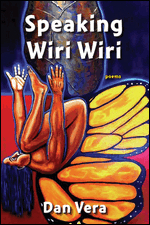
Speaking Wiri Wiriis the inaugural winner of the Letras Latinas/Red Hen Book Prize and a delight of memory, language, and place. Dan Vera was born of Cuban parents in South Texas and grew up surrounded by Mexican-American culture within the greater European-American culture. He writes eloquently of that sense of displacement within displacement, and it’s no accident that the first three sections of Speaking Wiri Wiri are “The Trouble With Language,” “The Trouble With Borders,” and “The Trouble With Memory,” nor that the title of the book itself refers to a phrase his father invented to indicate speech that was incomprehensible to his Cuban ear and mind.
Above all, Vera’s work is drenched in sense of place, a sense of history and of lives and stories that Neruda refers to when he writes that the poet should “speak, not of self, but of geography.” Not surprisingly, Vera is an editor and literary historian, as well as a poet. One of his great projects is the DC Writers’ Homes website, where he finds, researches, and directs readers to these inspirational sites of literary history.
Histories play a large role in Speaking Wiri Wiri, the forgotten histories of the Cuban women who melted down their wedding rings and jewelry to help finance arms, ammunition, and other desperately needed supplies for the U.S. Revolutionary War, of the Spaniard who raised a half a million dollars in silver to fund the final U.S. victory at Yorktown, of the sociopathic Che Guevara behind the handsome figure on the T-shirts, of the Cuban-American Friendship Urn that commemorates the partnership of the Spanish-American War, now hidden under an overpass in Washington, of the real story behind movie star Carmen Miranda, and of the Mayan, Aztec, and Toltec views of the divine power of garlic.
The slippery nature of language and Vera’s own displacement within it is a major theme throughout the book. In poems such as “Small Shame Blues,” he mourns his own estrangement from the full fluency with Spanish that he had as a child with Spanish spoken in the home. In “Playing Scrabble with Cousin Fela,” he points out the charms of Spanglish, which the game of Scrabble does not allow. In the delightful “Tower of Babel,” he tells a slapstick story of miscommunication when his father, wanting “change” for a five-dollar bill—“menudo” in Cuban Spanish—collides with a Mexican-American shopkeeper for whom “menudo” in Mexican Spanish is “tripe soup.”
As Vera considers borders in this book, he examines the shifting borders within us all, the linguistic remains of earlier borders within place names, the natural drift that sends plants, animals, insects, and people across artificial political borders, and the fear of the Other that leads to our attempts to seal our borders even as that Other has lived peacefully and legally within those borders for many generations, “Mr. Guzman Makes a Fool of Himself” and “The Constant Agitation Over What Belongs.”
Full of longing and bittersweet humor, these poems are lyrical, narrative, poignant, and always powerful. In his own search for who and what he really is, Vera has given us a true portrait of the confused and often contradictory place that is modern America.
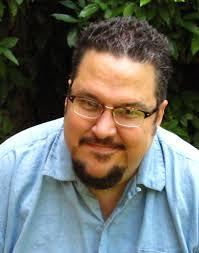
Bio:
Dan Vera is a writer, editor, and literary historian living in Washington, DC. He is the author of the two poetry collections Speaking Wiri Wiri (Red Hen, 2013), the inaugural winner of the Letras Latinas/Red Hen Poetry Prize, and The Space Between Our Danger and Delight (Beothuk Books, 2008). His poetry has appeared in various journals including Notre Dame Review, Beltway Poetry, Delaware Poetry Review, Cutthroat, Gargoyle, Little Patuxent Review, Naugatuck River, the anthologies Divining Divas, Full Moon On K Street: Poems About Washington, DC, and DC Poets Against the War. He's edited the gay culture journal White Crane, co-created the literary history site, DC Writers’ Homes, and chairs the board of Split This Rock Poetry.
Speaking Wiri Wiri can be purchased at bookstores and all online outlets, as well as at the fine small press that published it HERE . Learn more about Dan Vera at his website HERE . This is another great book and author brought to us at least partially through the amazing efforts of Letras Latinas, an organization that works tirelessly to promote Latino letters and writers. Learn more about Letras Latinas HERE .
"Books of Interest by Writers of Color" is a series I offer as a resource to learn about the many fine writers of color who are being published today, mostly by the small literary presses who are the heroes of publishing. As I prepared for the launch of my own recent fifth book, Every Broken Trust, I haven't made entries in this series or my other, "Literary Mystery Novelists," but I hope to rectify that in coming weeks. I have towering stacks of books I want to tell you about. Have a lovely weekend!
Published on June 06, 2013 08:19
May 28, 2013
Keeping a Writer’s Journal
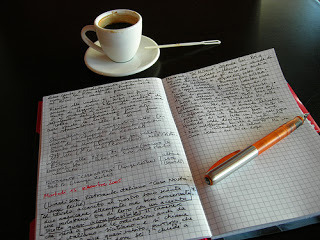
I have kept journals for many decades. Even before my creative writing professors encouraged me to keep them, I kept writer’s journals after reading that writers I respected, such as Virginia Woolf and Madeleine L’Engle, had kept writer’s journals. I have stacks and stacks of them, and periodically I wade through years of them, reading and mining for ideas and memories.You will notice I did not say I’ve kept diaries. A diary is an account of your day-to-day activities. A writer’s journal is the artist’s sketchbook of a writer. It holds the raw material, the thinking on paper, that goes into learning how to write better and into creating minor and major projects.
 A writer’s journal may have accounts of daily activities in it, along with discussions of current events, descriptions of the striking woman seen at the coffee shop, the idea for a new novel, the first few paragraphs of a short story, lines or whole stanzas of a poem, descriptions of the sound water makes dripping from trees into a fountain at the park, pages of location or historical research, a scary near-miss turned by what-if into the germ of a story or novel, lists of words I love, scenes recaptured from my childhood or other past moments, and much, much more. Writing exercises. Lists of possible titles. The initial sketches of characters. Accounts of dreams. Rants and complaints and a good bit of whining, as well.
A writer’s journal may have accounts of daily activities in it, along with discussions of current events, descriptions of the striking woman seen at the coffee shop, the idea for a new novel, the first few paragraphs of a short story, lines or whole stanzas of a poem, descriptions of the sound water makes dripping from trees into a fountain at the park, pages of location or historical research, a scary near-miss turned by what-if into the germ of a story or novel, lists of words I love, scenes recaptured from my childhood or other past moments, and much, much more. Writing exercises. Lists of possible titles. The initial sketches of characters. Accounts of dreams. Rants and complaints and a good bit of whining, as well.Now, I also keep computer journals as I write each novel. This is where I go deeper into character, work out plotting difficulties, set myself goals for the next chapter or section of the book, and keep track of things that impinge on the writing of the book. Older versions of this are what I turn to when I need to find out how long I think it will take me to complete some phase of the new book. Also, it’s where I look for encouragement when going through tough times on a book. I almost always find I’ve made it through something similar before. I keep my journals in bound books between novels and in addition to the novel journals kept on the computer.
 Add captionI can’t tell you how many times I’ve found ideas or characters or settings for stories, poems, and books while going back through these journals—or found ideas that connect with other ideas I have to complete the concept for a novel or poem. Also, as I look through them, I can see on the page how my writing has improved over the years. I consider these journals necessities for my continuing growth as a writer. Just as a musician continues practicing the scales and more ambitious exercises daily, just as a painter continues sketching constantly, I keep opening my journal and writing down a description or an idea or a question I’m wrestling with or a character I’m exploring. Madeleine L’Engle called her journal work her “five-finger exercises.”
Add captionI can’t tell you how many times I’ve found ideas or characters or settings for stories, poems, and books while going back through these journals—or found ideas that connect with other ideas I have to complete the concept for a novel or poem. Also, as I look through them, I can see on the page how my writing has improved over the years. I consider these journals necessities for my continuing growth as a writer. Just as a musician continues practicing the scales and more ambitious exercises daily, just as a painter continues sketching constantly, I keep opening my journal and writing down a description or an idea or a question I’m wrestling with or a character I’m exploring. Madeleine L’Engle called her journal work her “five-finger exercises.”I often tell young students to keep journals, even if they don’t want to become writers. I believe it will help them navigate the fraught waters of adolescence. I know it helped me come to terms with a damaging, abusive childhood and write my way out of the anger, pain, fear, and shame it engendered in me. I’ve used journaling as an effective therapeutic technique with incarcerated youth, and I believe it’s something anyone can do to help them work their way through emotional pain and problems.
 I have plain spiral notebooks, composition books, three-ring binders, and an assortment of bound books of many sizes and appearances. I have heard some people say they could never write in a really beautiful bound book because it would intimidate them, but I write even in the gorgeous handmade ones friends and family give me as luscious gifts. The act of writing is what keeps me from becoming too intimidated to write.
I have plain spiral notebooks, composition books, three-ring binders, and an assortment of bound books of many sizes and appearances. I have heard some people say they could never write in a really beautiful bound book because it would intimidate them, but I write even in the gorgeous handmade ones friends and family give me as luscious gifts. The act of writing is what keeps me from becoming too intimidated to write.If you’re a writer, do you keep journals? In notebooks or on the computer or both? And if you’re not a writer, have you used a journal before to work through thorny issues?
Published on May 28, 2013 21:07
May 21, 2013
The Importance of Saying No
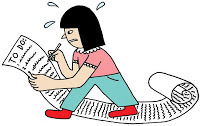 I have always had a hard time saying “no.” I like people, and I always want to help good causes. This has led to years of low pay in the nonprofit sector, tons of overwork, lots of volunteer hours, and on the good side, an awful lot of great friends. It also leads periodically to a terrible feeling of overload, that point I get to when I have so many urgent or overdue or essential tasks to do that I’m paralyzed. How do you prioritize when everything needs to be done RIGHT NOW?
I have always had a hard time saying “no.” I like people, and I always want to help good causes. This has led to years of low pay in the nonprofit sector, tons of overwork, lots of volunteer hours, and on the good side, an awful lot of great friends. It also leads periodically to a terrible feeling of overload, that point I get to when I have so many urgent or overdue or essential tasks to do that I’m paralyzed. How do you prioritize when everything needs to be done RIGHT NOW?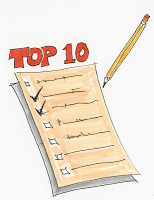 When I get to that point, I have to move into To-Do Triage. I list everything that’s demanding my attention (and get the most depressing multi-page list). Then I move down the list, asking myself, “What will happen if I don’t do this today?” If it isn’t job loss, client loss, contract violation, child endangerment, arrest, etc., it doesn’t go on the much tinier list to be dealt with right now.
When I get to that point, I have to move into To-Do Triage. I list everything that’s demanding my attention (and get the most depressing multi-page list). Then I move down the list, asking myself, “What will happen if I don’t do this today?” If it isn’t job loss, client loss, contract violation, child endangerment, arrest, etc., it doesn’t go on the much tinier list to be dealt with right now.The trouble is that you can’t live your life in To-Do Triage. At least, I can’t. Not as a permanent lifestyle. Sooner or later, you have to learn to say “no.” Even when it’s difficult. Even when it’s going to hurt someone’s feelings (whether it should or not). Even when it’s something you’d like to do. At least, if you want to write, you will. Sooner or later, you have to learn to guard your time like a mother eagle with her nestlings. And sooner or later, you’ll find yourself having to relearn it all over again. At least, I do. (Maybe I’m just a slow learner, and all the rest of you can learn this lesson once and for all, but it keeps coming up in new guises in my life.)
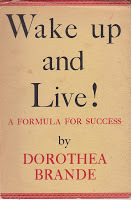 I remember the first time I learned the lesson of no. I was a young, broke mother of two (still in diapers) who wanted to write. The advice manuals I read were aimed at men with wives and secretaries or women with no children or enough money to hire help with the house and the kids. Since there was three times as much month as there was money, hiring anyone or anything was out of the question—I was washing cloth diapers in the bathtub by hand and hanging on a clothesline to dry because we hadn’t enough disposable income for the laundromat. Yet still I wound up the one in the neighborhood who canvassed with kids in stroller and arms for the March of Dimes and the American Cancer Society.
I remember the first time I learned the lesson of no. I was a young, broke mother of two (still in diapers) who wanted to write. The advice manuals I read were aimed at men with wives and secretaries or women with no children or enough money to hire help with the house and the kids. Since there was three times as much month as there was money, hiring anyone or anything was out of the question—I was washing cloth diapers in the bathtub by hand and hanging on a clothesline to dry because we hadn’t enough disposable income for the laundromat. Yet still I wound up the one in the neighborhood who canvassed with kids in stroller and arms for the March of Dimes and the American Cancer Society. One day someone who knew how much I wanted to write gave me a little book called Wake Up and Live by Dorothea Brande, who also wrote the wonderful On Becoming A Writer. As I read it, one sentence leaped out at me: “As long as you cannot bear the notion that there is a creature under heaven who can regard you with an indifferent, an amused or hostile eye, you will probably see to itthat you continue to fail with the utmost charm.”
I began carving out time and space for my writing, and to do it without shortchanging my babies, I cut out television and most of my community involvement. This lesson had to be relearned when those babies were high schoolers, my new youngest was a toddler, and I became a full-time student and a single working mother at the same time unexpectedly. It returned to be learned again when my oldest two were grown, my youngest in grade school, and I took on running a university women’s center that also served the community. Every time it had to be learned in a different way with different adjustments. Once I’d given up television, that option was no longer open to me. At one point, I switched my writing to poetry because what time I could create or steal was in such small fragments that it made novels impossible to write.
Now that I’m writing novels again and publishing them (as well as poetry and freelance work still), one of the time-eaters is the promotion work we authors must all do to win the readers we believe our books deserve. It’s not something that can be skimped on, and yet the creative work of designing and writing new novels must go forward, as well. For a while now, each request for my volunteer time and work has had to be carefully weighed, and most reluctantly rejected. At this time, my major volunteer commitment is our local chapter of Sisters in Crime, Border Crimes, of which I’m president this year. Everything else must sadly fall by the wayside—and some people are quite unhappy about that, as if they had the right to my time and skills because I’ve given them in the past. I’ve had to learn to deal with that.
What about the time book promotion takes, however? With my first novel (this was never a real issue with my poetry books and cookbook), I said “yes” to every opportunity, every event, every guest blog, every interview, every podcast, everything. And I managed to write books during that time, as well—and had the worst winter, healthwise, in many years, having worn my body down. This year I’m trying to be more strategic about the promotion opportunities I accept. I’m still saying “yes” to most of them—it’s part of my job, and I know that—but I’m examining them more closely and deciding against some that I don’t feel will be as useful for me. It’s hard, but once again I’m learning that lesson, which is apparently one of my life-lessons—“no” can be the friend of my writing and is necessary at times.
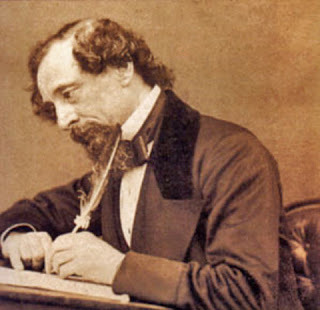 Charles Dickens, who was one of the earliest and most successful self-promoting writers, put it best for writers in any age when he said:
Charles Dickens, who was one of the earliest and most successful self-promoting writers, put it best for writers in any age when he said:“‘It is only half an hour’ — ‘It is only an afternoon’ — ‘It is only an evening,’ people say to me over and over again; but they don’t know that it is impossible to command one’s self sometimes to any stipulated and set disposal of five minutes — or that the mere consciousness of an engagement will sometime worry a whole day … Whoever is devoted to an art must be content to deliver himself wholly up to it, and to find his recompense in it. I am grieved if you suspect me of not wanting to see you, but I can’t help it; I must go in my way whether or no.”
Do you find it difficult to tell others “no” when they want your time? If you’re a writer, how do you create ways to balance the promotion and the writing?
Published on May 21, 2013 09:33
May 12, 2013
What a Great Book Launch!

Friday night, we had the official launch party for my newest novel, Every Broken Trust, at Mysteryscape, Kansas City’s newest independent bookstore. This weekend, Mysteryscape was also celebrating its one-year anniversary and offering a raffle for Every Broken Trust, Sally Goldenbaum’s newest book, Angora Alibi, and Dennis Lehane’s Edgar-winning Live By Night, plus a pound of Mysteryscape’s fantastic organic dark coffee and a Mysteryscape cup.
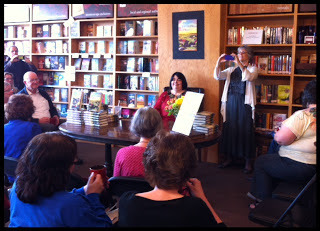 A lovely audience of about sixty people showed up to celebrate with me. People came from all over the metropolitan area. Some even drove up from Lawrence, Kansas, and others from Topeka, which is a 2-hour drive from Kansas City. There were old friends, who’ve long supported me and my books, and new friends that the books have made for me. Even some folks I’d never met before in person or online, but who’d become fans of the series with the first book, Every Last Secret. People kept coming in all through the launch right up until the end, so it was an exciting evening.
A lovely audience of about sixty people showed up to celebrate with me. People came from all over the metropolitan area. Some even drove up from Lawrence, Kansas, and others from Topeka, which is a 2-hour drive from Kansas City. There were old friends, who’ve long supported me and my books, and new friends that the books have made for me. Even some folks I’d never met before in person or online, but who’d become fans of the series with the first book, Every Last Secret. People kept coming in all through the launch right up until the end, so it was an exciting evening.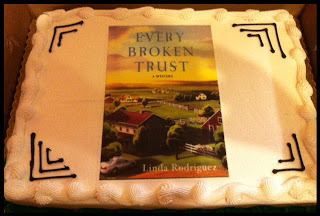
I had an absolutely gorgeous cake celebrating Every Broken Trust, but this year I kept the book cover smaller on the cake. Last year, I had Every Last Secret’s image cover the entire top of the cake and found that people were reluctant to cut into that beautiful cover. So most of the cake went uneaten. This year, with the cover in the center of the cake only, almost the entire cake was consumed.
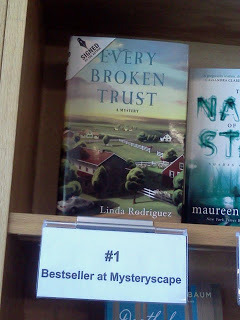 And we sold so many books that, with the pre-orders, Every Broken Trust became the #1 Bestseller at Mysteryscape. What great fun!
And we sold so many books that, with the pre-orders, Every Broken Trust became the #1 Bestseller at Mysteryscape. What great fun!I'd like to thank my friends who drove all the way from Lawrence and especially my sister who drove up with her son from Topeka to celebrate with me. (I know. I'm very fortunate in the sister I have.) And of course, my husband who is the most supportive spouse in the world.
Acia Morley and Cheri LeBlond who own Mysteryscape are wonderfully supportive of authors and of the reading community and deserve all of the grand success their new store is having.
I had many friends take photos and so have lots of lovely pictures, but for some reason Blogger keeps trying to post them upside down. So this blog only has the ones I could keep upright. I'll try to post some of the others on Facebook.
We had a great time, and I'd like to thank everyone who came, and all of you who posted notice of the book and the launch online and sent good wishes and, above all, pre-ordered Every Broken Trust. You guys are the best, and without you, all this could never happen.
Published on May 12, 2013 13:06
May 10, 2013
EVERY BROKEN TRUST Is Finally Out in the World
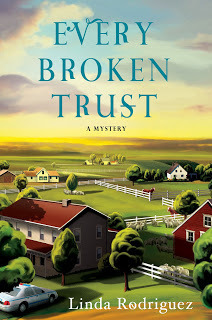
Today is my official book launch celebration for my second Skeet Bannion novel, Every Broken Trust, so I hope you’ll bear with me for a little blatant self-promotion—which I usually try to keep at a minimum on this blog.
This evening at 6:30 p.m. at Mysteryscape, 7309 W. 80th St., Overland Park, KS, we’re celebrating Every Broken Trust’s birth into the world, though the actual pub date was last Tuesday, May 7. That means that Every Broken Trust is available at stores near you and online, so I hope you’ll check it out.
I’ve been fortunate enough to have garnered some great reviews for this second novel, and I’ve quoted from some of them below. It’s been an exciting time lately with the new book coming out to good reviews and the first book, Every Last Secret, named a finalist for the International Latino Book Awards.
(For signed copies) Rainy Day Books Mysteryscape Powell's IndieBound Amazon Barnes & Noble
For those who want a taste of Every Broken Trust, you can read the first chapter at the link below and read other excerpts from the book in a great review on Criminal Element.
Read the first chapter of Every Broken Trusthere!
Read more on Criminal Element here!
I was on a popular public radio show in Kansas City yesterday as part of a great writers roundtable, and if you’d like to hear that show, the link is HERE .
ADVANCE PRAISE for EVERY BROKEN TRUST
"Linda Rodriguez gives readers a truly modern heroine in tough, independent, and complex police chief Skeet Bannion. Add powerful writing, edge-of-your-seat suspense, and a cast of characters you won't want to leave behind and Rodriguez delivers another terrific read."
— Deborah Crombie, New York Times bestselling author of No Mark Upon Her
“Linda Rodriguez is a richly talented writer. Her aim is true, and she strikes deep. This new work will reward you as it weaves its generous spell. Good stuff. Get it now.”
— Luis Alberto Urrea, bestselling author of The Hummingbird’s Daughter and Queen of America
“Skeet’s second outing (Every Last Secret, 2012) showcases a strong, intelligent woman with a difficult past that keeps returning to haunt her.”—Kirkus Reviews
“Satisfying… Credible characters enhance the absorbing plot.”—Publishers Weekly
“The first Skeet Bannion showed great promise for a series featuring a strong and complicated heroine. This sophomore effort cements Linda Rodriguez as a writer whose promise has been made good. Damn good book.”—Crimespree Magazine
“With Skeet Bannion as the lead, Linda Rodriguez' Every Broken Trust is one of the best traditional mysteries I've read this year.”—Lesa’s Book Critiques
“Rodriguez combines elements of the whodunit with those of the thriller in her second installment, a follow-up to last year's award-winning "Every Last Secret." Her latest not only fulfills its predecessor's promise but also furthers Skeet's story in ways that will have readers eager for her next case.”—Richmond Times-Dispatch
I hope you can join me tonight at the launch party. If you can’t, I’ll be thinking of all of you while there. I feel so fortunate to have found so many wonderful, supportive fans for the Skeet books all over the country! You readers are really what this is really all about, and I thank you and hope you’ll enjoy the new book, as well.
Published on May 10, 2013 08:56



